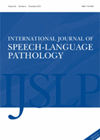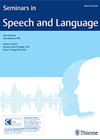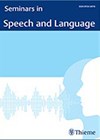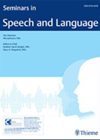
Journal Reviews
Starry eyed?
Attentive listening and active listening skills suggest that eye movement is an important factor in subject engagement. Indeed, when asked, AI suggests gaze is held for 70% of the time when listening. Although the route of this percentage is unclear,...
How do you actually get therapists to do the therapy you need them to?
Aphasia is an acquired communication disorder that affects approximately a third of people who have a stroke and for which speech and language therapy is the main treatment. However, there are known gaps between evidence-based recommendations and the delivery of...
Translanguaging: an integrated and culturally valid approach for speech and language therapy practice
This study advocates the need for speech and language therapists to understand and advocate for translanguaging practices within their day-to-day clinical work with children with communication difficulties. Translanguaging derives from the Welsh term ‘trawsiethu’, which was first introduced in 1994...
The risks of misjudging African American dialects as lesser!
Healthcare inequalities in multicultural societies, such as the UK, are becoming increasingly apparent. They arise via a complex interplay of factors, with socioeconomic deprivation, structural biases and specific cultural and biological risk factors all contributing to disparities. There is ample...
Drooling: what is it like to be unable to manage your own saliva?
Drooling in Parkinson’s is associated with less frequent and inefficient swallowing, resulting in a build-up of saliva in the mouth that then moves beyond the lips. It often causes discomfort as the skin becomes sore, and results in embarrassment. The...
The cocktail party conundrum
I feel, with slight sadness and disappointment, that a good cocktail party, dresses, punch bowls and all is not currently in its heyday and, therefore, opportunity of attending is slim. However, from what I remember, they tend to be a...
Expectations and practice
Reading this paper is reassuring. It does not appear to be groundbreaking in its results but research can be as useful, if not more so, when it consolidates knowledge and helps unify the research base. This paper focuses on those...
Let’s talk brains: review of care pathways for communication management post brain tumour
One in five people with a brain tumour have speech and language difficulties such as aphasia – a language impairment that can result in difficulties using and understanding words and sentences and participating in conversations. This paper describes a scoping...
Around the world: cultural adaptation of speech and language therapy interventions
Communication Partner Training (CPT) is a speech and language therapy approach whereby a person with an acquired communication disorder (such as a stroke, brain injury or dementia) and a close other are supported to have better conversations. Several intervention programmes...
Hot off the press: new clinically relevant research methodologies for speech and language therapy
Interpretive Description (ID) is a qualitative research framework developed to address the limitations in other qualitative methods that are not epistemologically able to take applied fields, such as clinical professions, into consideration. This framework, often described as a method, has...
Swallowing their words: translating and adapting swallowing questionnaires to other languages
Dysphagia (swallowing difficulties) is increasingly relevant given the ageing population. Yet measuring or assessing dysphagia is challenging and often costly when exploring instrumental examination. The aim of this study was to translate and validate a patient-reported swallow questionnaire; the Sydney...
Say what you don’t mean: cognitive difficulties in Parkinson’s can worsen intelligibility
Hypokinetic dysarthria, seen in 70–90% of people with Parkinson’s, causes reduced range of movement during speech production, reduced volume, rate, pitch and intelligibility. This study aimed to explore the role of higher cognitive function in speech production by asking 20...















